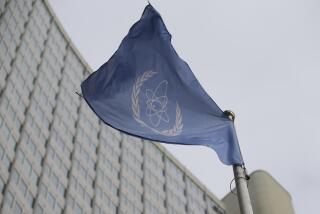U.S. Questions U.N. Findings on Iranâs Bid for Nuclear Arms
WASHINGTON â A U.N. inspectorsâ report that said no evidence had turned up that Iran has tried to develop nuclear weapons is âsimply impossible to believe,â the Bush administrationâs top arms control official said Wednesday.
In the administrationâs first official response to the harshly worded report, which was circulated this week among members of the International Atomic Energy Agency, Undersecretary of State John R. Bolton noted that the inspectors had found evidence that Iran had conducted a secret nuclear program for 18 years, and that it had committed numerous breaches of its nuclear treaty obligations.
In a speech prepared for a dinner of the American Spectator, a conservative magazine, he disputed the IAEAâs conclusion that âno evidenceâ has yet been found that the concealed activities were linked to a nuclear weapons program.
The administration believes that âthe massive and covert Iranian effort to acquire sensitive nuclear capabilities makes sense only as part of a nuclear weapons program,â Bolton said.
âIn what can only be an attempt to build a capacity to develop nuclear materials for nuclear weapons, Iran has enriched uranium with both centrifuges and lasers, and produced and reprocessed plutonium,â he said. âIt attempted to cover its tracks by repeatedly and over many years neglecting to report its activities, and in many instances providing false declarations to the International Atomic Energy Agency.â
The IAEA, the U.N.âs nuclear watchdog, is issuing its report as the international community considers whether to take action to prevent any Iranian effort to build arms. Next week, the IAEA board of governors is meeting to consider whether Tehran, which has continued to deny any intent to build nuclear weapons, should be held in violation of its nuclear treaty obligations.
The 30-page IAEA report harshly criticized Iran, saying that, over 18 years, the regime concealed from the United Nations both a centrifuge uranium-enrichment program and a laser enrichment program. It said Iran manufactured small amounts of enriched uranium and plutonium, a substance with virtually no civilian uses.
The report noted that the IAEA had so far found no evidence that Iran had sought to build nuclear weapons, as the Bush administration has asserted. But the IAEA intends to keep looking for such evidence, the report said, adding that it would be some time before the agency could conclude whether Iranâs nuclear program was exclusively for peaceful purposes.
Bolton, however, said âthe reportâs assertion [on nuclear arms] is simply impossible to believe.â Despite Tehranâs denial that it has any nuclear arms program, âthe IAEA has amassed an enormous amount of evidence to the contrary that makes this assertion increasingly implausible,â he said.
He accused Tehran of trying to falsely legitimize its pursuit of nuclear fuel cycle capabilities that would give it the ability to produce fissile material for nuclear weapons.
According to Bolton, Iran wants to develop the capability for uranium mining and extraction, uranium conversion and enrichment, reactor fuel fabrication and heavy-water production, as well as acquire a heavy-water reactor well suited for reprocessing spent fuel to recover plutonium. It is also pursuing â âmanagement of spent fuelâ -- a euphemism for reprocessing spent fuel to recover plutonium,â Bolton said.
He said that if Iran took all the steps sought by the IAEA, including full disclosure of nuclear activities and an agreement to allow unannounced inspections, such actions would âmark a major advance toward its integration into civilized society.â
But if Iran continues to conceal its program and âlie to the IAEA, the international community must be prepared to declare Iran in noncompliance with its IAEA safeguards obligations,â he said.
Such a declaration would put the issue before the U.N. Security Council and could lead to sanctions against Iran. Bolton did not disclose what course the United States would recommend when the 35 members of the IAEA board meet in Vienna on Nov. 20.
He noted that Iran, which President Bush last year grouped with North Korea and Saddam Husseinâs Iraq as part of an âaxis of evil,â also has ârobustâ biological and chemical weapons programs, as well as a missile development effort.
Iranian officials acknowledged this week that the country had failed to comply with all their treaty obligations, but they described the violations as minor and insisted that the IAEA report was proof that it was not developing nuclear weapons. Tehran is hoping that its new candor will persuade the international community not to take tough steps.
Jack Straw, Britainâs foreign secretary, took a milder tone this week in an interview with the British Broadcasting Corp., saying that the world âshould be reacting calmly to the latest report from the International Atomic Energy Agency.â
Although Iran had concealed its nuclear activities in the past, it was now cooperating with the agency, he noted.
Straw is scheduled to meet today in Washington with Secretary of State Colin L. Powell. The two are expected to discuss Iranâs nuclear interests.
More to Read
Sign up for Essential California
The most important California stories and recommendations in your inbox every morning.
You may occasionally receive promotional content from the Los Angeles Times.











